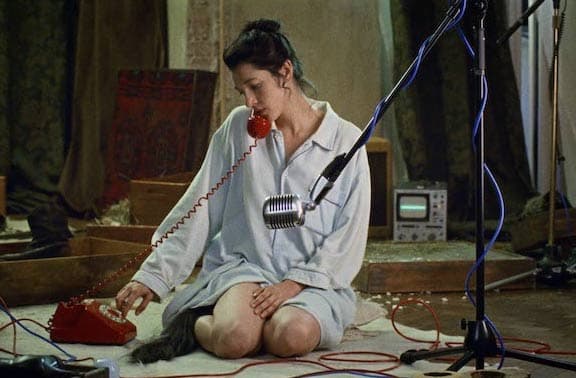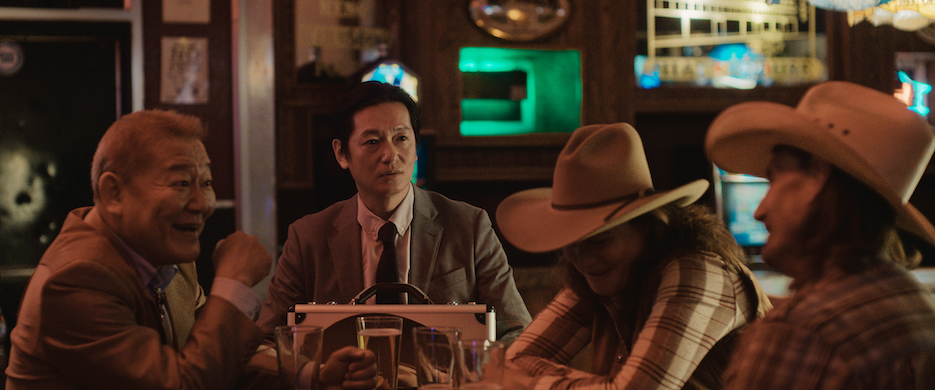Kafka’s ‘Metamorphosis’ Springs to Mind When Considering ‘Piaffe’
While Ann Oren’s debut feature is fare not intended for general audiences — it features a woman who deals with growing a tail — ‘Tokyo Cowboy’ is a crowd-pleaser that will have to find out what crowd it’s intended for.

Zeus transformed himself into a veritable zoo of beasts, Gregor Samsa woke up as a cockroach, and the preternaturally diffident Eva (Simone Bucio), the protagonist of director Ann Oren’s debut feature “Piaffe,” grows a tail — a horse’s tail, to be specific. Be cautioned that this addition to Eva’s physiognomy is the least outré part of a picture rife with narrative non sequiturs, prurient absurdities, and some icky byways. Welcome, one and all, to Surrealism 2.0.
Actually, strike the last analogy. “Piaffe” is, technologically speaking, old school. Not only has it been shot on 16mm film, but the set design by Ilaria Di Carlo makes a point of mechanisms — squeaky gears, rusty wheels, noisy locks, and other things that need oiling on a regular basis. The first thing the audience sees are the burnished brass holes of a kinetoscope through which we view stop-motion snippets of growing plants. Eva, you see, is the attendant at a botanical peep show. This won’t be the last time Ms. Oren, who co-wrote the script with Thais Guisasola, conflates sexual eccentricity with the prerequisites of nature.
Eva has been tasked with the job of providing sound effects for a television spot heralding a new antidepressant and attempts to replicate the noises created by a horse at the center of the campaign. When her efforts are derided by the commercial’s director — a mercurial individual with a platinum blonde ’do apparently inspired by Moe Howard of the Three Stooges — Eva sets out to commune directly with the animal world. Before you know it, a small nub begins to grow on her lower back, an appendage that will soon turn into a long and lustrous tail.
All the while, Eva becomes entranced by a man who is the only regular client at the peep show. Whereupon we learn why Novak (an appealingly haggard Sebastian Novak) is drawn to the premises: He’s in charge of the exhibits at a nearby botanical garden. When Eva shows up at his office door bearing roses, Novak, after a bit of hemming-and-hawing, makes a romantic overture — of a peculiar kind. What follows is a scene that is as willful in its provocations as it is genuinely erotic. Give Ms. Oren credit for touching a nerve even as she overplays her hand.

The title of the film refers to a maneuver in dressage in which a horse trots in place without gaining traction. It’s a fitting conceit for a movie that offers a series of digressions that accumulate rather than gain in momentum. There’s a mental hospital in which Eva’s non-binary sibling Zara (Simon[e] Jakiriuma Paetau) has been institutionalized, complete with an attendant who makes Nurse Ratched seem like Florence Nightingale. We’re also repeatedly shepherded to a discotheque in which our heroine becomes notably less withholding in her physicality. Tails, you know, they’re liberating.
Ms. Oren’s film is striking in its imagery, but overstays its welcome by a good 30 minutes. It’s also hampered by cinematic gimmickry. Scattershot lens flares, moments when the grain of the film becomes scratchy, and oh-so-symbolic double exposures are the pitfalls of, if not a first-time director necessarily, then someone who has spent too much time cloistered in art school. (The director earned her BFA and MFA from the School of Visual Arts.) David Lynch, a graduate of the Pennsylvania Academy of Fine Arts, both honed and transcended his early mannerisms. The same could prove true of Ms. Oren’s thorny, untethered talent.
If “Piaffe” is fare not intended for general audiences, “Tokyo Cowboy” is a crowd-pleaser that will have to find out what crowd it’s intended for. It’s an independent feature that is resolutely conventional in trajectory. Japanese businessman Hideki (Arata Iura) travels to Montana’s Big Sky country in the hopes of turning a profit on a struggling cattle ranch. After his companion, an expert on Wagyu beef (an irrepressible and underutilized Jun Kunimura), takes a dive on a mechanical bull, Hideki is left to his own devices.
A cadre of rough-and-tough, shoot-from-the-hip types eventually take a cotton to Hideki and he’s soon shedding his salaryman ways. A sidebar concerning an illegal quinoa farm is the most idiosyncratic aspect of what is, in the end, a likably middling entertainment. If you don’t mind a film that pretty much states its ambitions from the first frame, then you’ll enjoy this one just fine.

